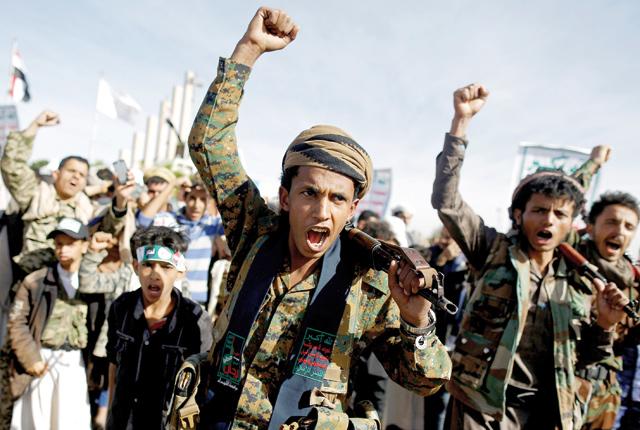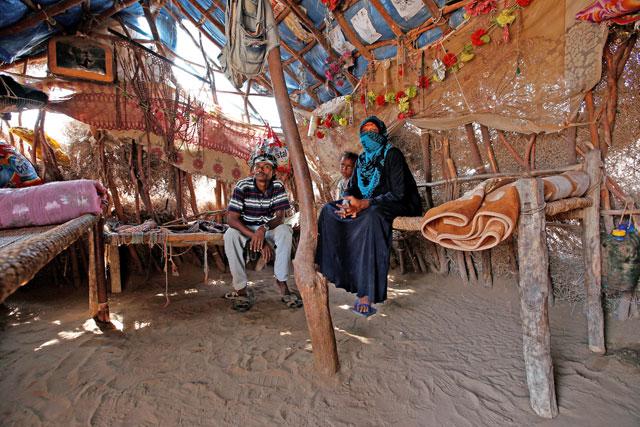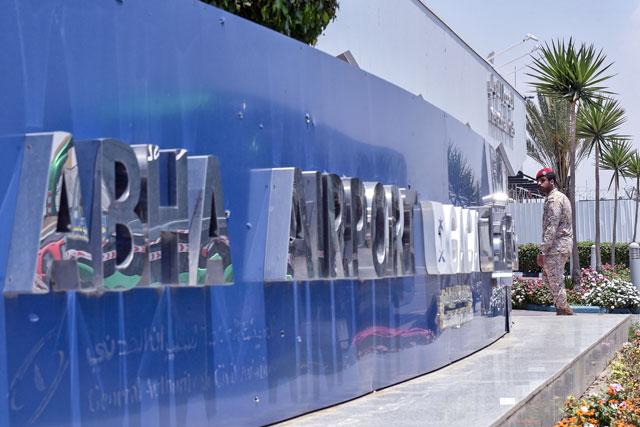You are here
Yemen's Houthis step up drone attacks on Saudi Arabia
By Reuters - May 22,2019 - Last updated at May 22,2019
DUBAI — Yemen's Iran-aligned Houthis have stepped up missile and drone attacks on Saudi Arabia this week in a resurgence of tactics that had largely subsided since late last year amid United Nations-led peace efforts.
The latest hostilities coincide with rising tensions between Iran and Gulf Arab states allied to the United States and come just as a sensitive, UN-sponsored peace deal is being carried out in Yemen's main port of Hodeida, a lifeline for millions.
The Houthis, who claimed responsibility for last week's armed drone strikes on oil assets in Saudi Arabia, said on Tuesday that one of their drones hit an arms depot at the kingdom's Najran Airport near the Yemeni border, causing a fire.
The Saudi-led military coalition said a civilian facility in Najran province was targeted with an explosive-laden drone.
It said on Monday that Saudi defence forces intercepted Houthi ballistic missiles fired towards Mecca, Islam's holiest site. The Houthis denied doing so.
On Sunday, the Houthis said they would attack 300 vital military targets in Saudi Arabia, the United Arab Emirates and Yemen.
Saudi Arabia and the UAE head a Western-backed coalition of Sunni Muslim states that intervened in Yemen in 2015 to try to restore the internationally recognised government ousted from power in the capital Sanaa by the Houthis in late 2014.
The movement has during the war repeatedly targeted Saudi cities and vital installations — mostly in border areas, but on several occasions the capital Riyadh as well. The Houthis pledged last November to stop attacks on Saudi Arabia and the UAE at the request of the United Nations.
While attacks on Saudi border areas continued, the Houthis had avoided targeting major cities or infrastructure. There have been no reports of attacks on the capital since last June.
The coalition has in return conducted multiple air strikes on the Houthi-held Yemeni capital Sanaa which it says target military facilities and aim to neutralise the group’s ability to fire missiles and drones.
Riyadh and Abu Dhabi accuse Iran of arming the Houthis, a charge denied by the group and Tehran.
It was not yet clear how the rising tension could impact a regional ceasefire and troop withdrawal deal in Hodeida — the first major diplomatic breakthrough in a conflict that has pushed Yemen to the brink of famine.
The deal was stalled for months before a unilateral Houthi withdrawal from Hodeidah and two other Red Sea ports 10 days ago. That is meant to lead to a pullback by coalition forces massed on the edges of Hodeida, the main entry point for Yemen’s commercial and humanitarian aid imports.
Saudi Arabia accused Iran of ordering last week’s drone strikes on two Aramco oil pumping stations, which followed sabotage acts on Saudi oil tankers off the UAE coast. Iran denied being behind the drone attacks.
The UAE has yet to blame anyone for the tanker operation, but US government sources told Reuters last week they believe Iran encouraged Houthi militants or Iraq-based Shiite militias to carry out the tanker attacks. Iran distanced itself.
US Secretary of State Mike Pompeo, due to testify at a closed-door hearing on Iran in the US Congress on Tuesday, said in a radio interview that the United States had yet to reach a definitive conclusion he could speak publicly about.
“But given all the regional conflicts that we have seen over the past decade and the shape of these attacks, it seems like it’s quite possible that Iran was behind these,” he told the Hugh Hewitt show.
Saudi Arabia will hold an emergency Arab summit in Mecca on May 30 to discuss the implications of the attacks, which came as the United States and Iran spar over US sanctions reimposed on Tehran and over the US military presence in the Gulf.
Yemen’s conflict is widely seen in the region as a proxy war between Saudi Arabia and Iran. The Houthis, who control the biggest urban centres in Yemen, deny being Iranian puppets and say they are waging a revolution against corruption.
The World Food Programme (WFP) said on Monday it was considering suspending aid deliveries in areas under Houthi control due to fighting, insecurity and interference in its work.
Some 9 million of the 12 million Yemenis whom the WFP is seeking to reach with rations each month live in Houthi-held areas, WFP spokesman Herve Verhoosel said, denouncing diversions of aid supplies especially in areas in Houthi hands.
“All this needs to stop. We are here to save 12 million people — many of them children and women — to save them from famine,” he told a briefing in Geneva.
Related Articles
DUBAI — Yemen's Iran-aligned Houthi movement on Thursday launched a drone attack on a Patriot missile battery in the airport of the Saudi ci
DUBAI — Yemen's armed Houthi movement said on Sunday it could attack warships and oil tankers from enemy countries in retaliation against th
RIYADH — A Yemeni rebel attack on a civilian airport in southern Saudi Arabia killed a Syrian national and wounded 21 other civilians Sunday



















